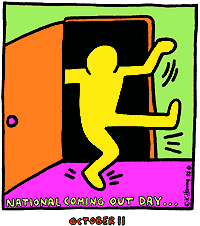Did you know that October 11th is a significant day in LGBT history in the United States? According to the Human Rights Campaign, Every year on October 11th, the United States celebrates the LGBT community with National Coming Out Day. If National Coming Out Day is new to you, you might ask yourself, “why October 11th?” It turns out that on October 11, 1987, about half a million people participated in the March on Washington for Lesbian and Gay Rights. It was the second demonstration in our nation’s capital that resulted in the founding of a number of LGBT organizations, including the National Latino/a Gay and Lesbian Organization (LLEGO’). The momentum continued for four months after this amazing march as more than 100 lesbian, gay, bisexual and transgender activists from around the country gathered in Manassas, Va., about 25 miles outside Washington, D.C. Recognizing that the LGBT community often reacted defensively to anti-gay actions, they came up with the idea of a national day to celebrate coming out and chose the anniversary of that second march on Washington to mark it. The originators of the idea were Rob Eichberg and Jean O’Leary. From this idea the National Coming Out Day was born.
Risks and Benefits
National Coming Out Day may give LGBT individuals the confidence to come out to their loved ones, but it’s important to know that not everyone has a supportive experience. There are risks and benefits of coming out, therefore, it’s important to determine what is right for you when choosing to come out.
Some risks you might encounter include:
- Homophobia
- Friends may not be supportive
- Parents may not be supportive
- Homelessness
- You might get asked a lot of uncomfortable questions
- You might lose friends
Some benefits of coming out:
- You won’t be afraid of people finding out
- You will have a chance to live authentically
- You can receive support from LGBT Organizations
- You will have the opportunity to make LGBT friends
- You can be a role model for other LGBT youth
- You may have improved self esteem
Deciding when to come out
- Be comfortable with who you are. When deciding to come out to your loved ones, it’s important to become comfortable with yourself before you begin to tell people. If you are confidant in yourself, you will be comfortable with the processing time it takes your loved one. You will feel more comfortable when answer questions and clarifying the process if necessary.
- Take your time. Don’t feel forced or pressured to come out by others. If you feel like people know and they are just waiting for you to confirm, let them wait. This is your journey and your life. Don’t let someone else’s expectations dictate your coming out experience.
- Find a safe person. This may be a friend, family member, or a counselor. Sometimes finding someone safe for the first time you say “I’m Gay” out loud makes all the difference for your confidence.
- Choose a safe moment and place. Deciding to come out to your family at your cousins wedding may not be the best idea. If you decide to come out, pick a day, time, and place where you and the person you are coming out to will have time to process this new information.
- Be patient. Allow your loved ones time to process this new information. Not everyone will be surprised or shocked, but there will be some people that didn’t see this coming. Give these individuals the time and space to come to terms with this information. Your family and friends might have some difficult questions for you. Help them understand where you are within the process and then allow them the chance to take their time. It might be hard for a dad to hear that his son is gay, then the next day get introduced to your boyfriend. Ask your family members how comfortable they are before you start adding on more information. Coming out as LGBT may be something you have been processing for years, so giving you family and friends’ time to process will be beneficial as well.
The process of coming out to your family and friends can be difficult. You may feel scared and uncertain about how your loved ones will react. Joining a LGBT support group will help you hear how others have dealt with the coming out period. Counseling can also be helpful during this time. If you find a counselor that is knowledgeable and sensitive about coming out as LGBT, you can process what it’s like during this time and have the support that you may be lacking.













